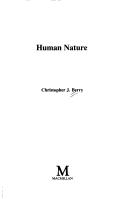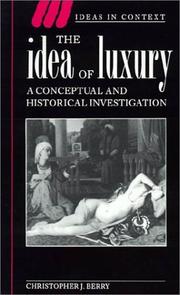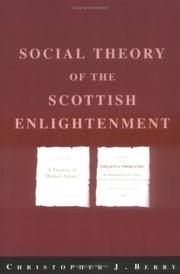| Listing 1 - 10 of 20 | << page >> |
Sort by
|

ISBN: 0333375246 Year: 1986 Publisher: Basingstoke Macmillan
Abstract | Keywords | Export | Availability | Bookmark
 Loading...
Loading...Choose an application
- Reference Manager
- EndNote
- RefWorks (Direct export to RefWorks)
Philosophical anthropology --- Political philosophy. Social philosophy --- Human beings. --- Natural law. --- Political science. --- Social values.

ISBN: 0521466911 0521454484 0511558368 Year: 1994 Volume: 30 Publisher: Cambridge Cambridge University press
Abstract | Keywords | Export | Availability | Bookmark
 Loading...
Loading...Choose an application
- Reference Manager
- EndNote
- RefWorks (Direct export to RefWorks)
In this far-ranging and innovative study Christopher Berry explores the meanings and ramifications of the idea of luxury. Insights from political theory, philosophy and intellectual history are utilised in a sophisticated conceptual analysis that is complemented by a series of specific historical investigations. Dr Berry suggests that the value attached to luxury is a crucial component in any society's self-understanding, and shows how luxury has changed from being essentially a negative term, threatening social virtue, to a guileless ploy supporting consumption. His analytic focus upon the interplay between the notions of need and desire suggests that luxuries fall into four categories - sustenance, shelter, clothing and leisure - and these are exemplified in sources as diverse as classical philosophy and contemporary advertising.
History of civilization --- Luxury --- Luxe --- History. --- Philosophy --- Histoire --- Philosophie --- Economics --- Wealth --- Cost and standard of living --- Leisure class --- History --- Arts and Humanities --- LUXE --- MANDEVILLE (BERNARD) --- HUME (DAVID), PHILOSOPHE ANGLAIS, 1711-1776 --- SMITH (ADAM), 1723-1790 --- HISTOIRE --- CRITIQUE ET INTERPRETATION --- PENSEE POLITIQUE ET SOCIALE
Book
ISBN: 9024726824 9400975902 9400975880 9789024726820 Year: 1982 Volume: 103 103. Publisher: The Hague Nijhoff
Abstract | Keywords | Export | Availability | Bookmark
 Loading...
Loading...Choose an application
- Reference Manager
- EndNote
- RefWorks (Direct export to RefWorks)
Hume, David, --- Hegel, Georg Wilhelm Friedrich, --- Contributions in anthropology --- Philosophical anthropology --- Hegel, Georg Wilhelm Friedrich --- -Hume, David --- -ヒューム --- Contributions in philosophy of history --- -Congresses --- -Contributions in philosophy of history --- Hegel, Giorgio Guglielmo Frederico --- Contributions in anthropology. --- Anthropology, Philosophical --- Man (Philosophy) --- Civilization --- Life --- Ontology --- Humanism --- Persons --- Philosophy of mind --- Philosophy --- Hegel, Georg Wilhelm Friedrich. --- Hume, David --- Hēgeru, --- Hei-ko-erh, --- Gegelʹ, Georg, --- Hījil, --- Khegel, --- Hegel, G. W. F. --- Hegel, --- Hei Ge Er, --- Chenkel, --- Hīghil, --- הגל, --- הגל, גאורג וילהלם פרידריך, --- הגל, גיאורג וילהלם פרידריך, --- הגל, ג.ו.פ, --- היגל, גורג ווילהלם פרדריך, --- היגל, גיורג וילהלם פרידריך, --- 黑格尔, --- Hegel, Guillermo Federico, --- Hegel, Jorge Guillermo Federico, --- Heyel, Georg Wilhelm Friedrich, --- Higil, Gʼūrg Vīlhim Frīdrīsh, --- هگل, --- هگل، گئورگ ويلهم فريدريش, --- Hume, David, - 1711-1776 --- Hegel, Georg Wilhelm Friedrich, - 1770-1831
Book
ISBN: 0745003591 Year: 1989 Publisher: Hemel Hempstead, Hertfordshire (UK) Harvester Wheatsheaf
Abstract | Keywords | Export | Availability | Bookmark
 Loading...
Loading...Choose an application
- Reference Manager
- EndNote
- RefWorks (Direct export to RefWorks)
Multi
ISBN: 9781474415019 9781474455855 9781474415026 9781474415033 1474415032 1474415016 1474415024 1474449735 Year: 2018 Publisher: Edinburgh Edinburgh University Press
Abstract | Keywords | Export | Availability | Bookmark
 Loading...
Loading...Choose an application
- Reference Manager
- EndNote
- RefWorks (Direct export to RefWorks)
Upper-level undergraduate students, postgraduates and scholars working specifically on the Scottish Enlightenment and early modern political and economic thought more generally.
Smith, Adam --- Hume, David --- Enlightenment --- Hume, David, --- Political and social views.

ISBN: 0748673865 0585060835 9780585060835 9780748673865 0748608648 9780748608645 Year: 1997 Publisher: Edinburgh Edinburgh university press
Abstract | Keywords | Export | Availability | Bookmark
 Loading...
Loading...Choose an application
- Reference Manager
- EndNote
- RefWorks (Direct export to RefWorks)
David Hume, Adam Smith, William Robertson, Adam Ferguson, Lord Kames, John Millar, James Dunbar and Gilbert Stuart were at the heart of Scottish Enlightenment thought. This introductory survey offers a clear interpretation and synthesis of the social thought of these thinkers.
Social sciences --- Philosophy, Scottish --- Enlightenment --- Behavioral sciences --- Human sciences --- Sciences, Social --- Social science --- Social studies --- Civilization --- History --- Philosophy. --- Scotland --- Intellectual life --- Philosophy --- Political philosophy. Social philosophy --- History of philosophy --- anno 1700-1799
Book
ISBN: 150130139X 1282875884 9786612875885 1441173927 9781441173928 9780826429803 0826429807 9781282875883 6612875887 9781501301391 9781441131232 144113123X Year: 2009 Publisher: London Continuum
Abstract | Keywords | Export | Availability | Bookmark
 Loading...
Loading...Choose an application
- Reference Manager
- EndNote
- RefWorks (Direct export to RefWorks)
"In this compelling and accessible account of the life and thought of the Scottish Enlightenment philosopher David Hume (1711-1776), Professor Christopher J. Berry of the University of Glasgow argues that the belief in the uniformity of human nature was at the heart of Hume's thought. In this volume, Berry introduces classic 'Humean' themes including the evolution of social institutions as an unintended consequence of the pursuit of self-interest, the importance of custom and habit in establishing rules of just conduct, and the defence of commerce and luxury. The book reveals Hume as an original thinker, whose thought may be understood as a combination of various strands of conservatism, libertarianism and liberalism."--Bloomsbury Publishing.
Ethics, Modern. --- Political science --- Political philosophy --- Modern ethics --- Philosophy. --- Hume, David, --- Political and social views. --- Ethics, Modern --- 192 --- 10 --- 330.08 --- 330.40 --- AA / International- internationaal --- Philosophy --- Wijsbegeerte --- Economisten --- Geschiedenis van het economisch en sociaal denken --- Hume, David
Book
ISBN: 0748645330 9780748645336 129980280X 9781299802803 9780748693788 0748693785 9780748645329 0748645322 9780748684533 0748684530 Year: 2013 Publisher: Edinburgh Edinburgh University Press
Abstract | Keywords | Export | Availability | Bookmark
 Loading...
Loading...Choose an application
- Reference Manager
- EndNote
- RefWorks (Direct export to RefWorks)
The most arresting aspect of the Scottish Enlightenment is its conception of commercial society as a distinct and distinctive social formation. Christopher Berry explains why Enlightenment thinkers considered commercial society to be wealthier and freer than earlier forms, and charts the contemporary debates and tensions between Enlightenment thinkers that this idea raised. The book analyses the full range of literature on the subject, from key works like Adam Smith's 'Wealth of Nations', David Hume's 'Essays and Treatises on Several Subjects' and Adam Ferguson's 'Essay on the History of Civil Society' to lesser-known works such as Robert Wallace's 'Dissertation on Numbers of Mankind'.
Enlightenment --- Capitalism --- Market economy --- Economics --- Profit --- Capital --- History --- Scotland --- Intellectual life --- Commerce --- Philosophy. --- History. --- Smith, Adam, --- Hume, David, --- Ferguson, Adam, --- Political and social views. --- Trade --- Traffic (Commerce) --- Business --- Merchants --- Transportation --- Caledonia --- Scotia --- Schotland --- Sŭkʻotʻŭllandŭ --- Ecosse --- Škotska --- Great Britain --- Hume, David
Book
ISBN: 9780312019709 031201970X Year: 1989 Publisher: Hemel Hempstead : Harvester Wheatsheaf,
Abstract | Keywords | Export | Availability | Bookmark
 Loading...
Loading...Choose an application
- Reference Manager
- EndNote
- RefWorks (Direct export to RefWorks)
Community --- Socialism --- Democracy --- Individualism --- Capitalism --- Capitalism. --- Communities. --- Democracy. --- Individualism. --- Socialism.
Book
Year: 1982 Publisher: The Hague Nijhoff
Abstract | Keywords | Export | Availability | Bookmark
 Loading...
Loading...Choose an application
- Reference Manager
- EndNote
- RefWorks (Direct export to RefWorks)
| Listing 1 - 10 of 20 | << page >> |
Sort by
|

 Search
Search Feedback
Feedback About UniCat
About UniCat  Help
Help News
News